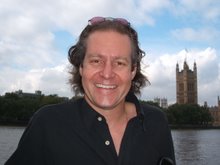On the Road
 Jack Kerouac’s On the Road turned 50 the other day. When I worked at the Museum of Broadcast Communications we had a great clip of Kerouac reading On The Road on the Steve Allen Show as Steverino made a little jazz piano behind him. Can you imagine Jonathan Franzen or Dave Eggers appearing on Letterman reading as the band just played a groove behind him? It’s a different time.
Jack Kerouac’s On the Road turned 50 the other day. When I worked at the Museum of Broadcast Communications we had a great clip of Kerouac reading On The Road on the Steve Allen Show as Steverino made a little jazz piano behind him. Can you imagine Jonathan Franzen or Dave Eggers appearing on Letterman reading as the band just played a groove behind him? It’s a different time.
But this blog is about film, and of my favorite sub-genres of film is the road move. (I am apologizing to my dad now because there will be no discussion of Bob Hope and Bing Crosby- and the film where Bob Crosby suddenly appears in the jungle because Bing promised him a role in the film. Great films, but not on topic.)
I often say to students, metaphorically, that the audience really wants a road map to where your film is heading. While not explaining everything, they do want to know where they are going once the film begins. The road film provides just that. We, the characters, the audience, the crew, everyone are going from point A to point B and we will meet new people and see new things along the way.
The other thing a good road film does is expose us to who we really are. Much like it took a French man, Alexis de Tocqueville, to write the definitive book about America’s first century, an outsider’s perspective to a culture is very valuable. All of this leads me to the definitive road film of my youth, Easy Rider.
Today Easy Rider is a relic of the 60s, both in its content and in its style, but it captures the zeitgeist of the times. Simply put, Captain America and Billy sell a pile of cocaine to crazy Phil Spector and set out across the country to find themselves. Along the way they go to a hippie commune, meet Jack Nicholson, a drunk lawyer from Texas, get harassed by rednecks for their long hair, take acid in New Orleans and come to an understanding that perhaps the American Dream isn’t what they thought.
The cinematographer of Easy Rider, Laszlo Kovacs, died a couple of weeks ago. He felt he learned a lot about America by shooting that film and going on the road with Fonda, Hopper, et. al. He said his biggest contribution to the film was to bring the perspective of a foreigner to the picture.
Here are a few of my other favorite road films.
The Wizard of Oz
Lost in America
Smoke Signals
PeterH







